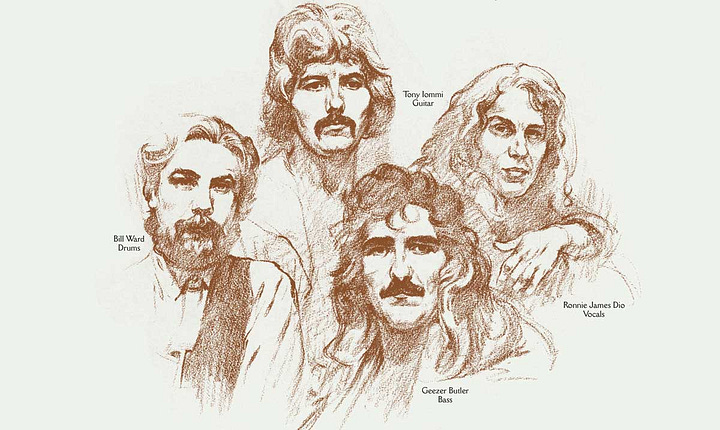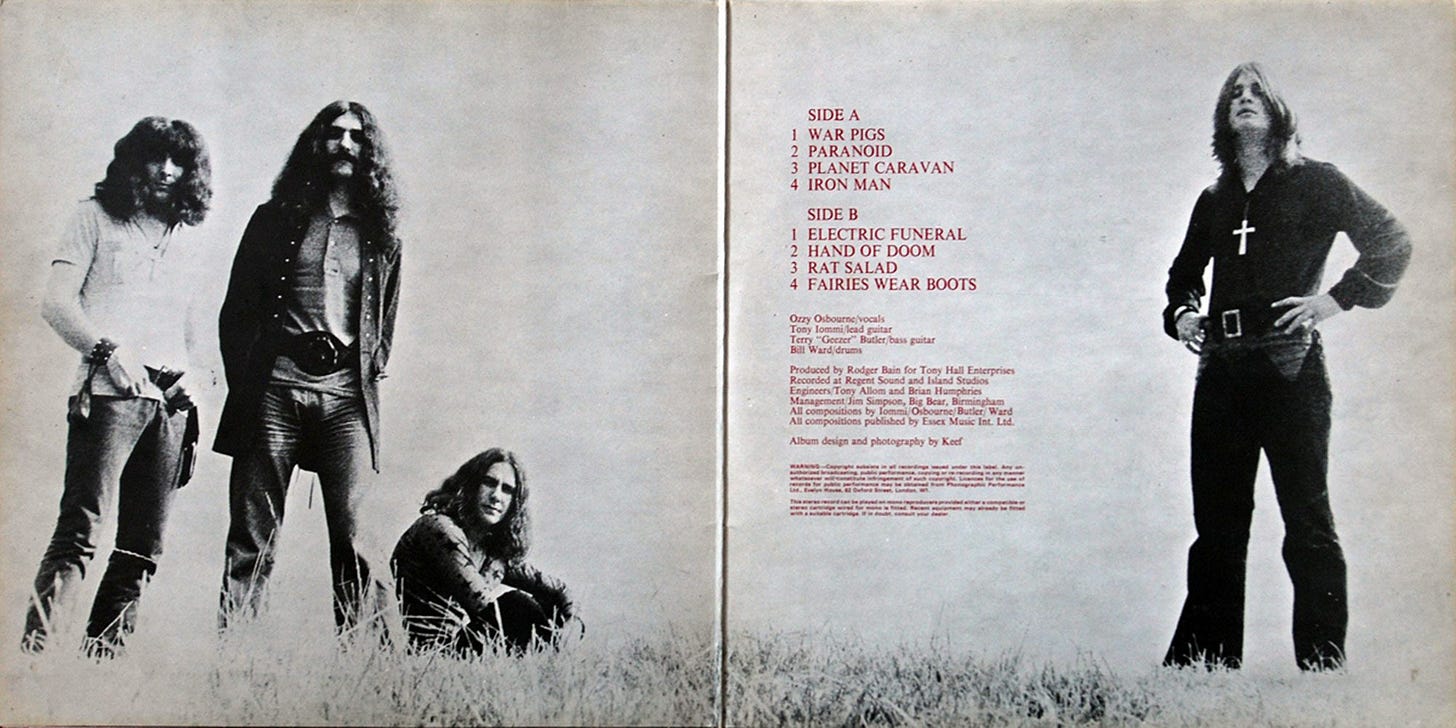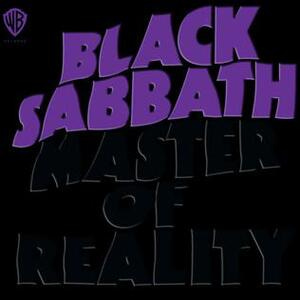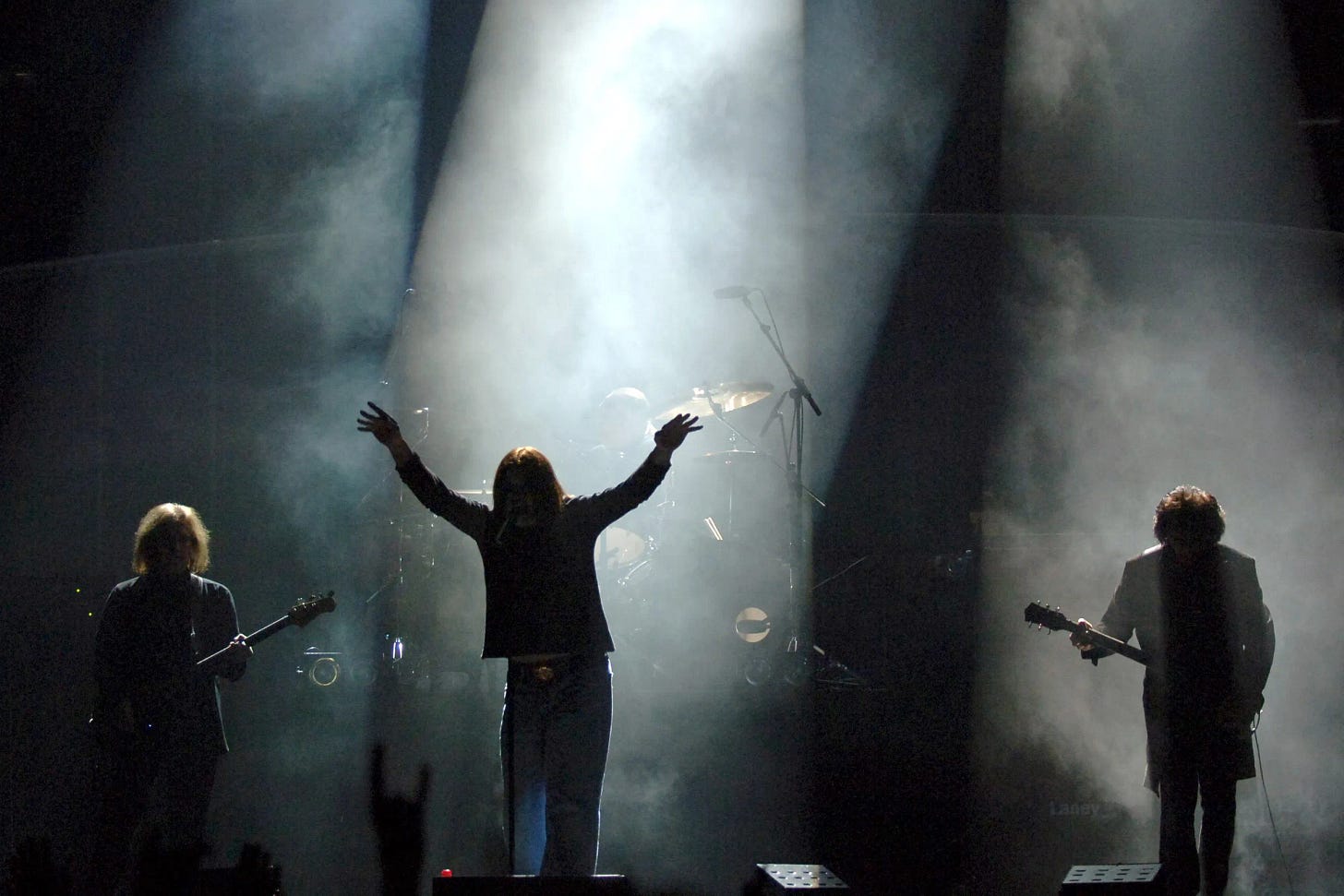Ranking the (Studio) Albums: Black Sabbath (Part V: #4-1)- Updated Epilogue
The greatest, by the greatest


It has been a long long road, revisiting Black Sabbath’s entire discography: from the low points to the ok-heading towards good, nearing greatness before finally getting there, there has been a ton to think through and even more to digest. But the final four albums in this series are all undisputed classics, and indeed some of the best music that has ever been made by anyone.
There are a great many things that make each of these albums masterpieces, but besides presenting a remarkable body of work each one showcases distinct facets of a band that innovated and tried different things simply because it felt like a good idea in the moment. The stories behind these records have all been endlessly told and retold, but what remains evergreen is the music itself: the livewire chemistry of Tony Iommi, Geezer Butler and Bill Ward; the dynamism and charisma radiating out of the man at the mic; the volcanic thunder of the guitars; the simple, undeniable power of the sound. But most of all, there are the songs. These songs are immortal.
#4: Heaven and Hell (1980)
“Cry out to legions of the brave”
In 1974, Deep Purple returned with a new frontman (actually, two) and more or less carried on as one of the biggest heavy rock groups in the world, even though Burn was quite different from their previous four records and neither David Coverdale nor Glenn Hughes was anything like Ian Gillan in look, sound or temperament. The general consensus seemed to be that Ritchie Blackmore was the linchpin, and as long as he stuck around and the band as a whole brought the power Deep Purple would continue going from strength to strength. And 2 years later it all felt apart spectacularly, in no small part because Blackmore got tired of his singers asserting themselves and foisting their vision on the group.
6 years later, Black Sabbath repeated almost this exact sequence, with the key distinction being that Tony Iommi was far more protective of his band and brand and wasn’t going anywhere (as the rankings up to this point have at times painfully illustrated). But even more than Burn, Heaven and Hell was a monumental statement of intent from a band universally seen as washed up and exhausted. Nearly 45 years later, the particulars surrounding its creation (Geezer not being present for most of the writing, Bill being so blitzed he literally can’t remember anything about the sessions, Geoff Nicholls and Craig Gruber claiming to have composed most of the bass parts, etc.) are not only incidental, but arguably immaterial: Sabbath’s 9th album holds up as a clarion call and signal that these four individuals were absolutely dynamite on record.
At least 5 songs from this album would be considered any other band’s finest work, with each bearing a distinct personality while still cohering perfectly. “Neon Knights” was nothing less than the heralding of a new world order: just like “Burn”, this was an astoundingly confident announcement of a focused and purposeful entity, with Ronnie James Dio stepping to the mic with such inevitability that he was undeniable. That this surge of power was followed by the dynamic and doomy “Children of the Sea” showed just how remarkable Sabbath 2.0 already was, and while one could argue that Ozzy could’ve sung over the music on the track’s verses, everything else, especially the arrangement, could’ve have only emanated from these four unique personalities. And it just kept coming- the title track was an ebbing and flowing beast of an epic, while “Die Young” stood up alongside the very best of the New Wave of British Heavy Metal that the band (certainly Dio) was keeping an eye on. Everything about these numbers was absolutely perfect, and even the goofy “Lady Evil” had a certain charm to it- the enthusiasm these guys had for playing together, really the first time in at least 4 years Tony, Bill and Geezer didn’t sound burdened or burned out, was infectious. And however sloshed he may have been, Bill Ward’s drumming was impeccable throughout, with Martin Birch giving the entire album a smooth but not overly polished sheen.
But while “Lonely is the Word” ended Heaven and Hell on a strong if strangely downcast note, the somewhat filler-ish “Wishing Well” and “Walk Away” diluted the overall power of the record slightly, and “Lady Evil” was goofy. But literally every other track was a straight-up masterpiece, and this album is second only to Rainbow’s Rising as the best thing Ronnie James Dio ever made.
Rating: 4.5/5
#3: Paranoid (1970)
“He just stares at the world”
If Black Sabbath’s first album introduced a mammoth and unholy new sound, their second proved they had the songs to back it up. There is almost no point in even mentioning how monumental and awesome every last song on Paranoid was, is, and always will be, but what continues to astound over 50 years later is the way each track flows into the next, how it all holds together as an album and singular statement.
And listening to Paranoid as an entire album, rather than as a collection of (mostly) overplayed warhorses, goes a long way towards making these songs remain fresh- as burned out as we all are on the title track, it retains a charge and magic when coming right after “War Pigs” and then segueing into “Planet Caravan”. And the entire second side essentially distills the first album into a remarkably tight suite of genre-inventing bulldozer jams.
That’s the thing about Paranoid: although “War Pigs”, “Paranoid”, “Iron Man” and “Fairies Wear Boots” have been played to death by everyone including the band themselves, nobody can deny that these are some of the most stunning pieces of music ever recorded. And even if “Planet Caravan” and “Electric Funeral” don’t get nearly as much airplay, they are every bit as significant in the creation of an entirely new form of music.
Heavy music, in all of its guises over the past 55 years, simply would not be what it is and has become without Paranoid in its entirety. The key distinction between it and the last two albums in this series is largely a matter of invention vs. refinement and perfection.
Rating: 5/5
#2: Master of Reality (1971)
“When you think about death do you lose your breath or do you keep your cool?”
An entire subgenre of music was invented in 1971, not with a riff, drum fill, melody or lyric but with a bong hit and hacking cough. That “Sweet Leaf” then immediately gave way to a Tony Iommi riff that was both among his doomiest and most swaggering sums up the very specific idiosyncratic charm of this group of individuals, because as silly as the track was (and let’s be honest, it is silly), everything we know and love about Black Sabbath’s original lineup is encapsulated in these 5 minutes: Ozzy’s gonzo charisma and inimitable bleat that sounded both excited and freaked out, Iommi’s wall of guitar, Geezer Butler’s globules of bass and Bill Ward’s power swing were all on righteous display.
Master of Reality was on the whole a much more serious record than its opening track suggested, and showed just how far Sabbath had come as writers and performers in the space of barely two years. In just three albums, they went from a heavy blues band wallowing in the murk (awesomely so, to be sure) to an absolute juggernaut, and the album’s sense of light and shade was every bit on par with what Led Zeppelin was doing around the same time- the instrumental sections and interstitials were much less jammy and formless, offering thoughtful and seamless transitions that provided a bit of breathing room between rhinoceroses like “After Forever”, “Children of the Grave” and “Lord of This World”. These weren’t as catchy and immediate as Paranoid’s most famous numbers, but they built on those songs by upping the ante at every turn.
By the same token, there was not a single wasted moment on Master of Reality, which was not only the culmination of everything Sabbath had been working towards up to that point but was arguably even more foundational in the development of metal than its predecessor. If Paranoid fully harnessed the band’s heft, Master of Reality added muscle: all of the aforementioned tracks had as much if not more heaviness, but were also sharper both musically (Iommi’s riffs were tighter, and Bill and Geezer were in full lockstep) and lyrically (these were the clearest and most vivid articulations of their actual worldview). Perhaps best of all, from start to finish the whole thing flowed perfectly, ebbing and flowing with far more logic than Sabbath’s reputation would suggest.
For most fans, Master of Reality is firmly ranked among the top tier of Black Sabbath records, and more than a few put it at the top. A sizeable albeit distinct contingent would place it a hair below Paranoid, while still acknowledging both as among the greatest albums in history. Depending on the day, both are right- Sabbath didn’t make a single false move for at least 3 years, so maybe this particular ranking should be flipped, or maybe not. These are both perfect records, as is the next one.
Rating: 5/5
#1: Vol. 4 (1972)
“Got all I want and I don’t need to pretend”
This series has gone deep on Black Sabbath’s entire studio discography, traversing all corners and spending just as much time (if not more) on their less famous moments than on the blockbusters. And more than once, cocaine has been a common thread throughout these proceedings. So in a way it makes sense that the record that wins the match was originally going to be named after a track that not only detailed the sensation of inhaling copious amounts of nose candy but straight up shouted it out by name after the first verse, and then credited the band’s yayo dealers in the liner notes.
All of this, alongside the surrounding lore of a group of bums from bombed-out Birmingham being coked out of their skulls in sunny Los Angeles, created the perception that Vol. 4 was an addled mess. And even though it sold well and continued Sabbath’s forward momentum, in plenty of corners their fourth record is considered the one where the wheels began to fall off.
But as is the case with a huge portion of the Black Sabbath catalogue, time has been much kinder to Vol. 4, and 50+ years later it resonates as perhaps their most complete statement as a band. Everything came together: the heavy moments were gargantuan, the fast ones blitzed with unparalleled frenzy, the quieter moments were more musical, Iommi’s riffs were mammoth, Ozzy was fully actualized as a vocalist and frontman, Geezer’s bass told stories upon stories and Bill Ward was on fire throughout.
However zonked and fried the guys may have been, they still had a firm grasp on their abilities as writers and players, and from front to back Vol. 4 smokes. “Wheels of Confusion” and “Under the Sun” bookend the album with epic undiluted heaviness, while “Tomorrow’s Dream” and the towering “Supernaut” mowed down everything in their path, with the latter arguably being Sabbath’s best fast one ever, even better than “Paranoid”. And in between were brilliant album tracks and instrumentals that, just like with the record’s two predecessors, all flowed cohesively and in full synchronicity: even “Changes”, as cheesy as it sounds on its own, fits perfectly when placed in the context of this record in between “Tomorrow’s Dream” and “FX” giving way to “Supernaut”.
Vol. 4 is the Black Sabbath record that gains the most from repeat listens, continuing to reveal new treasures with each passing decade. That the band had lost their innocence by this point gives the album added weight, revealing a group that were no longer upstarts but masters of their form, and these songs present that mastery in its most accomplished state.
Rating: 5/5
Epilogue
10 years after their final album, and 8 years after their final show, is there any unfinished business surrounding Black Sabbath? Most signs would point to their story being complete: 13 was an international blockbuster, and their farewell tour played to packed houses all over the world. And as noted at the very beginning of this series, neither Geezer nor Ozzy were particularly interested in making another record.
There is also the cold hard truth that even if Sabbath wanted to return, even for just one last gig, they’re not physically or mentally up for it. By almost all accounts, Geezer has settled into contented retirement, going borderline Gandalf when spotted at hockey games. Bill claims to be of sound body and mind, but every so often word comes out that his heart is more touch and go than he lets on. Tony looks in good spirits and generally good shape, and seems eager to get back to playing, but after years of cancer treatments he also (understandably) gives off vibes that he’s skittish about putting himself through the rigors of being in an active band. And Ozzy… if his induction as a solo artist into the Rock and Roll Hall of Fame demonstrated anything- beyond his sizable impact on music- it was that the odds of him ever performing again appear slim at very best.
But then again… all four original members are still alive, and Bill’s absence from 13 and those last tours was profoundly felt. Maybe one show, even just three songs (as Bill suggested) would be too much for Ozzy, but is one last single truly impossible? One last go with the original lineup would just feel right, in whatever shape that might assume. But the reality is that all four need to agree on a single next step, and that does appear unlikely if not impossible.
UPDATE: February 5, 2025
Well, it looks like the impossible is happening: all four original members have signed to play one last gig together as Black Sabbath. To say this was unexpected is an understatement- everything written above remains true, and given Ozzy’s numerous tour announcements and cancellations over the past 5 years nobody should be completely certain this gig will actually happen. Still, the fact that Ozzy, Tony, Geezer and Bill actually agreed and committed to playing together means there is at least a chance that the Black Sabbath saga will end as it should, with its founding members bringing the magic one last time in front of a hometown crowd, and as true heroes and icons.
But no matter how this story ultimately ends, Black Sabbath left behind a discography without parallel, and over the course of 43 years birthed an entire genre, then refined it their own way. It wasn’t always the most satisfying journey, but it was never boring, and at their frequent best Sabbath was simply the best there ever was.













My favorite Sabbath of all time are also Vol. 4 at first, followed by Master of Reality at second.
I will have to check it out.